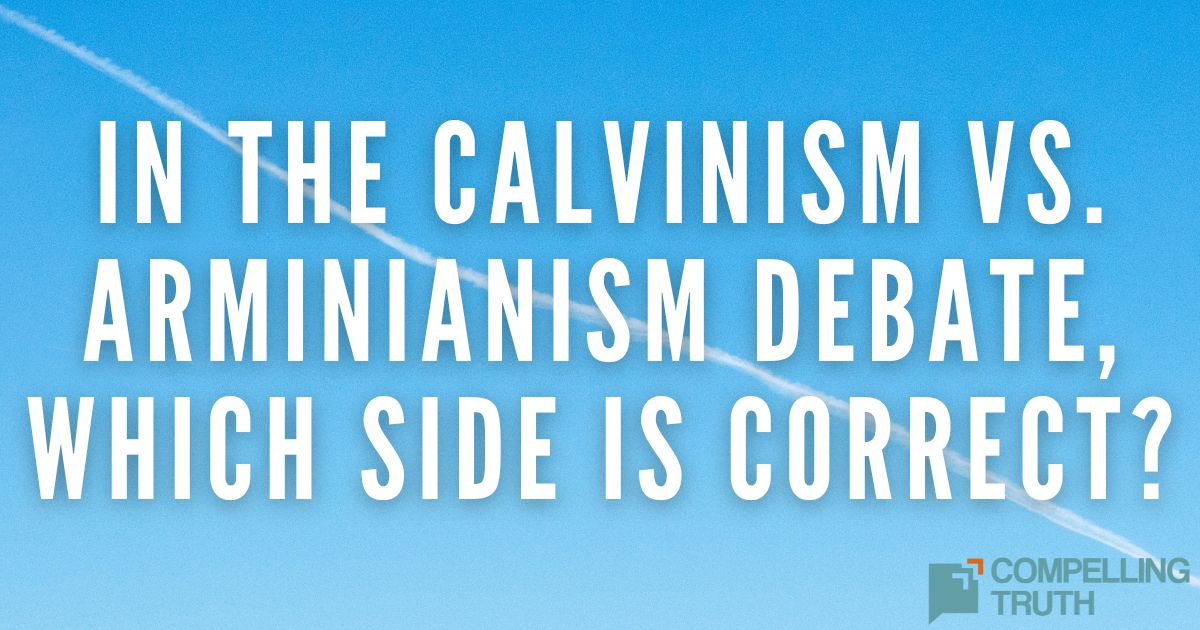Generally speaking, Molinism is a theological perspective that tries to bridge the gap between Arminianism and Calvinism. All three of these theological views are attempts to understand and explain God's sovereignty and mankind's free will, primarily in relation to salvation. The name "Molinism" is derived from the name of a 16th Century Jesuit named Luis de Molina who first proposed this theological concept.
Where Arminianism and Calvinism both hold distinct views on God's sovereignty and mankind's free will, Molinism tries to find a middle ground, so to speak, that encompasses aspects of both of those theological perspectives. To do this, Luis Molina developed a theological concept which he referred to as "middle knowledge." This is defined as God's knowledge of what someone with free will would do in any given circumstance—not just the choice they will make, but every choice they could possibly make and the outcome of each of those choices.
In Molinism, middle knowledge is nestled between natural knowledge, creative command, and free knowledge. Each of these is an attempt to express the totality of God's knowledge as well as give support to the theological concept of middle knowledge.
Natural knowledge is God's knowledge of all truth. This complements His middle knowledge because it is in His natural knowledge that God knows every possible truth, and therefore the outcome of every possible combination of decisions and actions made by anyone.
Creative command is God's decision to act based on His knowledge.
Free knowledge is His knowledge of what He has created.
Natural and middle knowledge are said to be independent of God's will. That is, God's knowledge of all that can be (natural knowledge) and all that could be (middle knowledge) are not reliant on His will (which determines what actually is). Free knowledge is completely dependent on God's will since it is dependent on what He has created. Molinism uses the concept of middle knowledge to try to express the idea that God is sovereign over everything, but that in His sovereignty He has allowed free will. That is to say, God is sovereign and humans are free. God is in control of everything, and yet human choices are not forced.
Is Molinism Biblical?
Generally speaking, there is no direct support or refutation of Molinism in Scripture. Calvinism, Arminianism, and Molinism are philosophical-theological systems that cannot be fully defended or refuted using only Scripture. Of course, Scripture does still speak on these matters.
Scripture is clear that God is sovereign over everything in creation (Proverbs 16:33; Matthew 10:29; Romans 11:36; Ephesians 1:11; James 4:13–17). God does not require the input or actions of mankind to fulfill His will (Acts 1:7; 17:24–28), nor does God learn anything new (1 John 3:20; Isaiah 46:9–10); His knowledge is complete at all times and always has been. However, God has not only determined the outcome of everything that will ever happen (Isaiah 46:10), He has also determined the means by which that outcome will be brought to bear (Psalm 33:9–11; Proverbs 19:21; John 14:13; Ephesians 1:11; Revelation 4:11). In other words, God uses the prayers and actions of mankind to fulfill His will. We see scriptural support both for God's sovereignty and for human free will.
Molinism doesn't refute any of the scriptural evidence for God's sovereignty, and generally agrees with most of what either Calvinism or Arminianism has to say. It is an attempt to bridge the gap between ideas such as total depravity in Calvinism and partial depravity in Arminianism, or unconditional election vs conditional election.
When it comes to the depravity of mankind and the justification of the saints, Calvinism, Arminianism, and Molinism all bring different approaches to bear in seeking to understand God's sovereignty in relation to salvation and free will. None of these perspectives is a substitute for diligent study of the Scriptures with prayerful consideration of their meaning. "But the Helper, the Holy Spirit, whom the Father will send in my name, he will teach you all things and bring to your remembrance all that I have said to you" (John 14:26).
Where Arminianism and Calvinism both hold distinct views on God's sovereignty and mankind's free will, Molinism tries to find a middle ground, so to speak, that encompasses aspects of both of those theological perspectives. To do this, Luis Molina developed a theological concept which he referred to as "middle knowledge." This is defined as God's knowledge of what someone with free will would do in any given circumstance—not just the choice they will make, but every choice they could possibly make and the outcome of each of those choices.
In Molinism, middle knowledge is nestled between natural knowledge, creative command, and free knowledge. Each of these is an attempt to express the totality of God's knowledge as well as give support to the theological concept of middle knowledge.
Natural knowledge is God's knowledge of all truth. This complements His middle knowledge because it is in His natural knowledge that God knows every possible truth, and therefore the outcome of every possible combination of decisions and actions made by anyone.
Creative command is God's decision to act based on His knowledge.
Free knowledge is His knowledge of what He has created.
Natural and middle knowledge are said to be independent of God's will. That is, God's knowledge of all that can be (natural knowledge) and all that could be (middle knowledge) are not reliant on His will (which determines what actually is). Free knowledge is completely dependent on God's will since it is dependent on what He has created. Molinism uses the concept of middle knowledge to try to express the idea that God is sovereign over everything, but that in His sovereignty He has allowed free will. That is to say, God is sovereign and humans are free. God is in control of everything, and yet human choices are not forced.
Is Molinism Biblical?
Generally speaking, there is no direct support or refutation of Molinism in Scripture. Calvinism, Arminianism, and Molinism are philosophical-theological systems that cannot be fully defended or refuted using only Scripture. Of course, Scripture does still speak on these matters.
Scripture is clear that God is sovereign over everything in creation (Proverbs 16:33; Matthew 10:29; Romans 11:36; Ephesians 1:11; James 4:13–17). God does not require the input or actions of mankind to fulfill His will (Acts 1:7; 17:24–28), nor does God learn anything new (1 John 3:20; Isaiah 46:9–10); His knowledge is complete at all times and always has been. However, God has not only determined the outcome of everything that will ever happen (Isaiah 46:10), He has also determined the means by which that outcome will be brought to bear (Psalm 33:9–11; Proverbs 19:21; John 14:13; Ephesians 1:11; Revelation 4:11). In other words, God uses the prayers and actions of mankind to fulfill His will. We see scriptural support both for God's sovereignty and for human free will.
Molinism doesn't refute any of the scriptural evidence for God's sovereignty, and generally agrees with most of what either Calvinism or Arminianism has to say. It is an attempt to bridge the gap between ideas such as total depravity in Calvinism and partial depravity in Arminianism, or unconditional election vs conditional election.
When it comes to the depravity of mankind and the justification of the saints, Calvinism, Arminianism, and Molinism all bring different approaches to bear in seeking to understand God's sovereignty in relation to salvation and free will. None of these perspectives is a substitute for diligent study of the Scriptures with prayerful consideration of their meaning. "But the Helper, the Holy Spirit, whom the Father will send in my name, he will teach you all things and bring to your remembrance all that I have said to you" (John 14:26).



